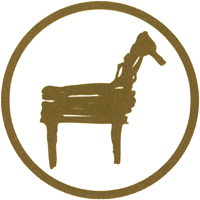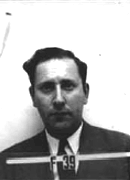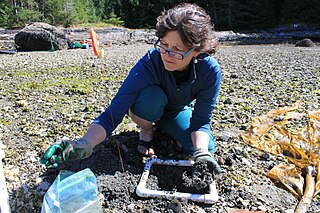Related Research Articles

Robert McCormick Adams Jr. was an American anthropologist and secretary of the Smithsonian Institution (1984–94). He worked in both the Near East and Mesoamerica. A long time professor of the University of Chicago, he was best known for his research in Iraq.

Edmund Wade Davis is a Canadian cultural anthropologist, ethnobotanist, author, and photographer. Davis came to prominence with his 1985 best-selling book The Serpent and the Rainbow about the zombies of Haiti. He is professor of anthropology and the BC Leadership Chair in Cultures and Ecosystems at Risk at the University of British Columbia.

Ethnobiology is the scientific study of the way living things are treated or used by different human cultures. It studies the dynamic relationships between people, biota, and environments, from the distant past to the immediate present.
Ethnoecology is the scientific study of how different groups of people living in different locations understand the ecosystems around them, and their relationships with surrounding environments.

Robert Eugene Marshak was an American physicist, educator, and eighth president of the City College of New York.

André Beteille, is an Indian sociologist, writer and academician. He is known for his studies of the caste system in South India. He has served with educational institutions in India such as Delhi School of Economics, North Eastern Hill University, and Ashoka University.

Language geography is the branch of human geography that studies the geographic distribution of language(s) or its constituent elements. Linguistic geography can also refer to studies of how people talk about the landscape. For example, toponymy is the study of place names. Landscape ethnoecology, also known as ethnophysiography, is the study of landscape ontologies and how they are expressed in language.
Michael Eugene Harkin is one of the leading anthropologists in the United States specializing in the ethnohistory of indigenous people of the western U.S. and Canada. He is currently professor and former chair of anthropology at the University of Wyoming, having previously taught at Emory University and Montana State University. In 2011 he was Fulbright Distinguished Chair in Cultural Studies at the Karl-Franzens University in Graz, Austria, and in 2007 he was a visiting professor at Shanghai University.
Darrell Addison Posey was an American anthropologist and biologist who vitalized the study of traditional knowledge of indigenous and folk populations in Brazil and other countries. He called his approach ethnobiology and combined research with respect for other cultures, especially indigenous intellectual property rights.
Ethnozoology is the study of the past and present interrelationships between human cultures and the animals in their environment. It includes classification and naming of zoological forms, cultural knowledge and use of wild and domestic animals. It is one of the main subdisciplines of ethnobiology and shares many methodologies and theoretical frameworks with ethnobotany.

Nancy Jean Turner is a notable North American ethnobiologist, originally qualified in botany, who has done extensive research work with the indigenous peoples of British Columbia, the results of which she has documented in a number of books and numerous articles.
John Richard 'Rick' Stepp is an anthropologist and ethnobiologist who currently holds the position of UF Research Foundation Professor at the University of Florida. Stepp was previously the G. P. Wilder Professor of Botany at the University of Hawaii.
Nina Lilian Etkin was an anthropologist and biologist. Etkin was noted for her work in medical anthropology, ethnobiology, and ethnopharmacology. She studied the relation between food and health for over thirty years. Her work involved complementary and alternative medicines for prevention and treatment in Hawai‘i; the use of ethnomedicines in Indonesia; and health issues in Nigeria. She won numerous grants and awards from national and international agencies and published several books as well as over 80 professional articles in peer reviewed journals.
Catherine "Kay" S. Fowler is an anthropologist whose work has focused on preserving the cultures of the native people of the Great Basin. She earned her PhD from the University of Pittsburgh, and from 1964 to 2007 taught at the University of Nevada, Reno, where she is now Professor Emerita.
Ralph Neville Hermon Bulmer was a twentieth-century ethnobiologist who worked in Papua New Guinea, particularly with the Kalam people. From 1974 he made a radical shift by changing the role of his Kalam informants and collaborators, allowing them to shape the purpose of ethnography and to make them authors rather than consultants. Bulmer's tree frog is named after him.
Jan Salick is an American botanist who researches the interaction between humans and plants (ethnobotany) and conservation biology. Her specialisms include alpine environments, climate change, indigenous peoples and traditional knowledge. She is a past-president of the Society for Economic Botany and holds their Distinguished Economic Botanist award. She is also Fellow of the American Association for the Advancement of Science and received the Fairchild Medal for Plant Exploration. In 2019 she retired as Senior Curator of Ethnobotany at the Missouri Botanical Garden, and now has emerita status.

Dana Sue Lepofsky is a Canadian archaeologist and ethnobiologist. She is a professor at Simon Fraser University, a former president of the Society of Ethnobiology, and received the Smith-Wintemberg Award in 2018. Her research focuses on the historical ecology of the indigenous peoples of the Pacific Northwest Coast.
Eugene N. Anderson is a professor of anthropology emeritus at the University of California, Riverside.
Elda Miriam Aldasoro Maya is a Mexican biologist, anthropologist and popularizer. She is a pioneer in the study of ethnoentomology in Mexico and of interdisciplinary research that uses theoretical approaches from biology and anthropology to study ethnobiology from a political, economic, social and cultural perspective. Her work has contributed to the documentation of indigenous knowledge, the promotion of activities around community development, the implementation and design of participatory methodologies, as well as biocultural education activities.
Cecil H. Brown is a distinguished research professor emeritus of anthropology at Northern Illinois University. His work relates to comparative linguistics and ethnobiology.
References
- ↑ "Hunn's Short Vita" (PDF). UW Faculty Web Server. Retrieved 10 December 2022.
- ↑ Johnson, Leslie M.; Hunn, Eugene S. (2010). Landscape ethnoecology: concepts of biotic and physical space. Berghahn Books.
- ↑ "Eugene S. Hunn". University of Washington. Retrieved 10 December 2022.
- ↑ "Archeology Program". National Park Service. Retrieved 10 December 2022.
- ↑ Borras, Catherine. "AAAS Council Meeting, 1983" . Retrieved 10 December 2022.
- ↑ "Dr. Eugene Hunn Wins the 2014 Distinguished Ethnobiologist Award". Society of Ethnobiology. Retrieved 10 December 2022.